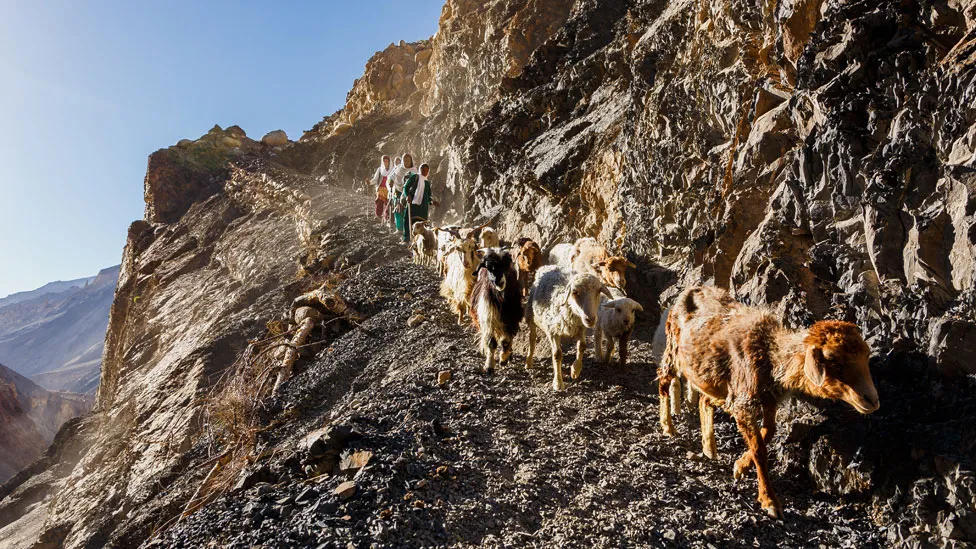The BBC has celebrated the accomplishments of 100 “inspiring and influential women” from around the world by revealing their identities in accordance with an annual tradition. As of Tuesday, the list has welcomed two Pakistani women. They are Wakhi shepherdess Afroze-Numa and Neha Mankani, who advocates for women’s health.
Alongside the two women are shown notable people, including Hollywood actress America Ferrera, human rights attorney Amal Clooney, former US First Lady Michelle Obama, AI specialist Timnit Gebru, Ballon d’Or winner Aitana Bonmatí, feminist icon Gloria Steinem, and beauty expert Huda Kattan.
Afroze-Numa, who is recognised by the BBC as “one of the last Wakhi shepherdesses,” is appreciated for her services to the community in maintaining customs. She spent almost thirty years of her life tending to goats, yaks, and sheep, so her name highlights the value of the family enterprise, which is in danger of dying out in Pakistan’s Shimshal valley.
Herds of sheep are led by Wakhi shepherdesses to pastures situated 4,800 metres (16,000 feet) above sea level. They make sure their cows feed in this rough terrain so they can make dairy products to trade. Because of the money they made, the municipality has become wealthy and is able to pay for its children’s education.
Mankani received praise for her attempts to lessen the effects of the climate catastrophe, especially in the wake of Pakistan’s devastating floods the year before. The midwife-social worker visited the impacted areas to share her knowledge of negotiating “low-resourced settings, emergency response, and climate-affected communities.”
The founder of the Mama Baby Fund, Mankani, and her colleagues provided life-saving delivery supplies and midwifery assistance to almost 15,000 flood-affected families. To guarantee that expectant mothers who live in coastal areas are transferred securely, the maternity care organisation intends to launch a boat ambulance service.
Read More
Mankani said in a BBC interview that “the work of midwives in communities facing climate-related disasters is vital.” As first responders and climate activists, we ensure that women have access to the prenatal, postpartum, and reproductive healthcare they require, even in the face of rapidly deteriorating conditions.
The list of 28 Climate Pioneers, which includes Mankani, emphasises the seriousness of catastrophes brought on by climate change and the need for preventative and adaptation measures. Extreme heatwaves and flooding increased dramatically in 2023, disproportionately affecting regions that were already at risk.
The BBC debuted “100 Women,” a multiformat series, in 2013. The annual series looks at how women’s roles have changed in the twenty-first century. In addition to “climate pioneers,” other categories include “entertainment and sport,” “science, health, and tech,” “culture and education,” and “politics and advocacy.”
Some general FAQs about the topic
Consequently, the Tajiks are the ancestors of the Wakhi, a Persian people. The Wakhi speak an Indo-European language that belongs to the Iranian branch of the language family. Wakhi, a sect of Shia Islam that rejects several traditional Islamic practices, are Progressive Ismailis. They also have distant relations with the Tajiks of Persia.
The West Pamir is currently home to the Ismaili Shia Muslim ethnic groups of Shughni, Rushani, Bartangi, Roshorvi, Khufi, Ishkashimi, and Wakhi.
The Wokhik (وخόϩ) ethnic group in Iran, originally from Central and South Asia, is also known as the Wakhi people (Wakhi: وخό; Russian: Baxaнц̋; Chinese: 瓦汗 or ϓ).
Linguists commonly classify Wakhi as a Pamir language within the Southeastern Iranian branch of the Indo-European language family. It is closely related to the neighbouring languages of Yidgha, Munji, Sanglechi-Ishkashimi, and Shughni. More recent studies, however, have questioned Wakhi’s Pamiri group origins.
In Jammu & Kashmir, India, there are 350 Burusho people, which is a relatively tiny number. The ethnolinguistic group known as the Burusho, or Brusho, is indigenous to Gilgit-Baltistan in northern Pakistan, namely the valleys of Yasin, Hunza, Nagar, and other areas. Another name for them is Botraj.
Islamic beliefs and practices influence practically every facet of Pakistani life, as the vast majority of people in Pakistan are Muslims or follow Islamic traditions. The majority of people in Pakistan identify as Sunnis, the predominant branch of Islam.
Tajikistan’s Wakhi minority lives in Roshchara and Ishkosim in Gorno-Badakhshan. The Wakhi majority in Afghanistan lives in Wakhan, Badakhshan. The Wakhi live largely in Gilgit-Baltistan, northern Pakistan, in the upper Hunza Gojar region.
Special thanks to BBC
Share this content:
